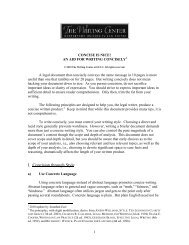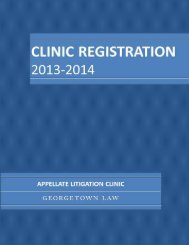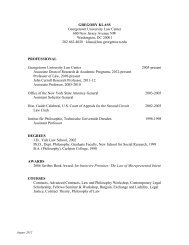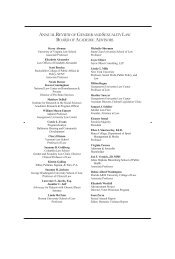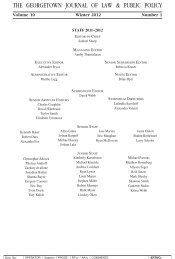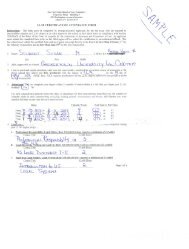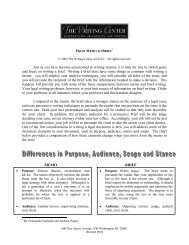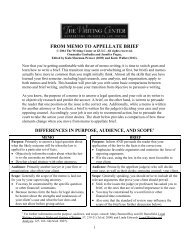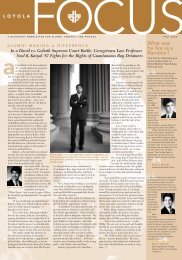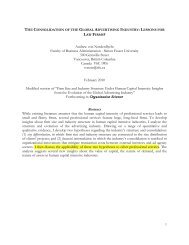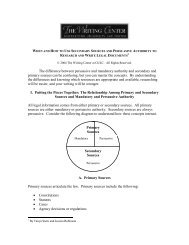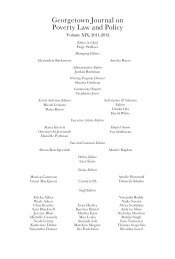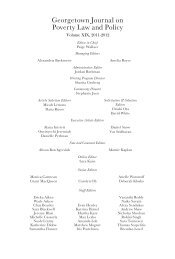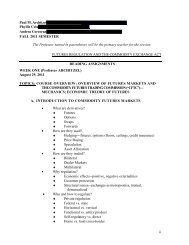Date: April 12, 2013 Topic: The Shrinking ... - Georgetown Law
Date: April 12, 2013 Topic: The Shrinking ... - Georgetown Law
Date: April 12, 2013 Topic: The Shrinking ... - Georgetown Law
Create successful ePaper yourself
Turn your PDF publications into a flip-book with our unique Google optimized e-Paper software.
H2: Wider document download patterns (involving a larger number of unique partners)<br />
will increase a manager’s subsequent value creation.<br />
Although more document downloading may increase value creation in general, our<br />
arguments above about the social view of technology suggest that the results may depend on preexisting<br />
social ties between the users and producers of knowledge accessed through the KMS.<br />
For complex knowledge, such as that found in legal services, it may be difficult to effectively<br />
understand another person’s prior experiences reflected in their downloaded documents. Prior<br />
social relations with the knowledge provider can help to clarify the meaning of the document and<br />
how that knowledge can be applied in other cases. As mentioned earlier in our case study, reuse<br />
of documents with which one is not familiar can easily lead to mistakes and be confusing for<br />
clients, leading to conflict and client dissatisfaction. Similarly, without prior social relations an<br />
individual’s attempt to use different people’s documents may be fraught, and not lead to any<br />
clear improvement in client services. In this case the search and efforts around it become wasted<br />
time that negatively impact on ability to generate client revenue. Hence without any social ties,<br />
technology based search appears more likely to lead to a “dead end” or to knowledge misuse,<br />
reducing the value created.<br />
H3: Downloading documents from directly-tied partners will increase a manager’s<br />
subsequent value creation more so than downloading documents from non-tied providers.<br />
Going deeper into knowledge use when social ties exist, we can consider two types of<br />
connections between user and provider of knowledge: they could share either indirect ties, if they<br />
work with common colleagues (but not each other), or they could share direct ties, if they<br />
actually already work together on projects. Research in social networks suggests that indirect ties,<br />
which are often called “weak ties,” have greater benefits for individuals because they are more<br />
likely to provide new and non-redundant useful information to the focal person. In contrast,<br />
direct or “strong” ties are more likely to provide information to the focal person that he or she<br />
already knows and which is therefore of less value (Granovetter 1973). Hence we argue that<br />
indirect tie-based document use should provide the optimal context for value creation because<br />
knowledge originating in this social context is most likely to be novel and actionable.<br />
H4: Downloading documents from indirectly-tied partners will increase a manager’s<br />
subsequent value creation more so than downloading documents from directly-tied<br />
partners.<br />
METHODS<br />
Qualitative data<br />
Data collection for this project took place between 2005 and 2010. For our quantitative<br />
analysis, we obtained access to the log file of the KMS for the period 2005-2010. In addition, we<br />
were granted access to billable and non-billable hours information, for each member of the firm,<br />
from 1999 to 2010, and to reports prepared in the context of individual yearly performance<br />
evaluations, which showed who had worked with whom (and for what volume of hours) from<br />
1999 to 2010, with the exception of 2007 1 . We immediately anonymized all files received.<br />
1 <strong>The</strong> files showing who had worked with whom, in 2007, were corrupted and unusable. <br />
<br />
6



